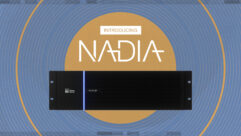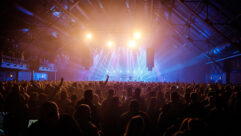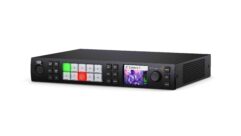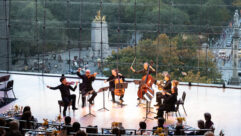

Billed by the
New York Times
as “the most important science museum to have opened since the mid-20
th
century,” San Francisco’s Exploratorium has recently opened its new multidisciplinary theatre, the Kanbar Forum. To fully support its programming diversity and inspire original works of multimedia art, the Exploratorium has become the first museum facility to install a ConstellationA® acoustic system, supplemented with a palette of other audio tools from Meyer Sound.
Installed in more than 50 venues worldwide, Constellation is a technology that allows venues to alter a room’s acoustics from an intimate recital hall to a vast cathedral with the push of a button. One of Kanbar Forum’s first programs to take advantage of Constellation is a live performance series named
Resonance
.
“We’re very excited about exploring the Constellation system’s potential for both artists and scientists,” says Nicole Minor, the Exploratorium’s manager of moving images. “We’ve only scratched the surface of what we can do with it. I expect we’ll be able to develop an entirely new breadth of work focused on both the art and the science of sound.”
Constellation has impressed both staff and visitors at the Exploratorium. “As part of his
Full-Spectrum Science
series, our Staff Scientist Ron Hipschman has been demonstrating Constellation in his talks,” says Minor. “Switching through the presets, he elicits ‘oohs’ and ‘aahs’ with just his voice and handclaps when the audience experiences the startling, yet natural acoustical effects.”
Constellation is built on Meyer Sound’s patented VRASâ„¢ acoustical algorithm. The configuration in Kanbar Forum features 12 distributed microphones and more than 90 loudspeakers, including Stella-4C installation loudspeakers, MM-4XP self-powered loudspeakers, UP-4XP 48 V loudspeakers, and MM-10XP 48V subwoofers.
The Kanbar Forum’s expansive audio toolbox also includes SpaceMapA® multichannel panning, a technology that allows sound designers to fly sounds through space. SpaceMap is used in
Fathom
, a sound installation by Shane Myrbeck and Emily Shisko as part of the series
Soundscapes
.
A sound reinforcement loudspeaker system in the venue features UPQ-2P and MM-4XP loudspeakers, UPJ-1P and UPJuniorâ„¢ VariOâ„¢ loudspeakers, and 600-HP subwoofers with a GalileoA® loudspeaker management system.
The Exploratorium’s Executive Associate Director Ron Semper and renowned multimedia pioneer Kristina Woolsey conceived the audio systems in the Kanbar Forum. System design specifics were developed by Phil Bailey of systems integrator BBI Engineering, in consultation with theatrical design firm The Shalleck Collaborative.
“It took a great deal of effort by a lot of dedicated people to create a room that looks so deceptively simple, yet has the potential for such a variety of uses,” says Adam Shalleck, principal and president of The Shalleck Collaborative. “All parties worked together to ensure that the Kanbar’s technical and aesthetic elements fit in with the Exploratorium’s vision.”
While the Kanbar Forum stands out as a technology showcase, more than 120 additional Meyer Sound loudspeakers are installed in 11 other locations around the Exploratorium, including the Webcast Studio, the Bay Observatory Gallery, the Outdoor Exploratorium plaza, The Retail Store, conference rooms, and classrooms. These spaces feature 12 different loudspeaker models, ranging from the discreet MM-4XP loudspeaker to the 700-HP subwoofer.
Established by physicist and educator Frank Oppenheimer, the Exploratorium was originally located in San Francisco’s Palace of Fine Arts. The museum moved to expanded and technologically enhanced facilities at Piers 15 and 17 on the San Francisco waterfront in 2013. The new Exploratorium was designed by EHDD.










